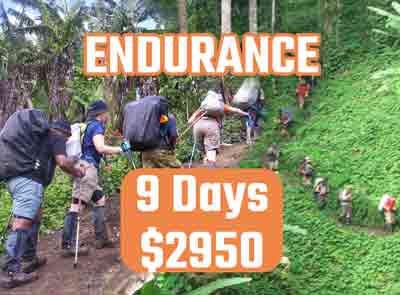Hiking Safety Tips: Stay Safe When on the Hiking Trail. Essential Safety Tips for Every Hike and Hiker.
Introduction
Trekking the Kokoda Track is a challenging yet rewarding adventure, offering a glimpse into the wartime history of Papua New Guinea. To ensure a safe and enjoyable experience, it’s crucial to prioritize hiking safety. This comprehensive guide will cover essential safety tips, medical considerations, and emergency preparedness to help you navigate the Kokoda Trail with confidence.
Preparing for the Hike
Medical Pre-trek Health Screening
Before embarking on the Kokoda trek, undergo a thorough medical pre-trek health screening. Ensure you are physically fit to endure the challenges of hiking in a remote and rugged terrain.
Hiking Insurance
Consider obtaining hiking insurance to cover unforeseen circumstances. This can include medical emergencies, evacuations, and potential trip cancellations.
Dealing with Flora and Fauna
Stinging Nettle Weed and Leeches
Be aware of stinging nettle weed and leeches along the trail. Wear appropriate clothing, such as gaiters and long sleeves, to minimize exposure. Regularly check for leeches and remove them promptly.
Hiking Safety Essentials
Bush First Aid
Equip yourself with basic bush first aid knowledge and carry a well-stocked first aid kit. Be prepared to address common hiking injuries, including scrapes, insect bites, and potential encounters with local flora.
Altitude Considerations
As you traverse the Kokoda Trail, be mindful of changes in altitude. Gradual acclimatization is essential to prevent altitude-related illnesses.
Essential Safety Tips
Plan Your Hike
Before setting out, meticulously plan your hike. Inform a friend or family member about your trip details, including your intended route and estimated return time.
Check the Weather
Stay informed about the weather forecast for the duration of your hike. Sudden changes in weather can pose risks, so plan accordingly.
Water Sources
Identify reliable water sources along the trail, and carry sufficient water to stay hydrated. Be cautious of potential contaminants and treat water if necessary.
Backpack Essentials
Pack your backpack with essential safety items, including a personal locator beacon, a fully charged mobile phone, and extra water. The 10 essentials should always be included in your hiking gear.
Hiking Smart
Navigation and Communication
Stay on designated trails, and if venturing off-trail, exercise caution. Communicate your plans with fellow trekkers, and always carry a map of the national parks and reserves you’ll be traversing.
Emergency Plan
Have a well-defined emergency plan in place. Know the location of nearby medical facilities and evacuation options. Familiarize yourself with the park map, and have a clear understanding of the trail’s markers.
Insect Bite Prevention
When planning a hike, to prevent insect bites (including mosquito bites that may give you malaria), wear long sleeves and pants. Use insect repellent, and be vigilant in checking for ticks, especially in dense vegetation.
Hydration and Nutrition
Don’t forget to stay fuelled and hydrated during your hike. Be aware of dehydration symptoms and carry snacks that provide sustained energy.
Medivac Options: A Vital Aspect of Safety
In the remote and challenging terrain of the Kokoda Trail, understanding medivac options is a critical component of ensuring hiker safety. In case of a medical emergency, having a reliable evacuation plan can make all the difference. Familiarize yourself with available medivac options, such as helicopter evacuations, and ensure that you carry information about your emergency contacts and medical history. Being proactive about medivac preparedness adds an extra layer of assurance, assuring that help can swiftly reach you in case of unforeseen circumstances. This knowledge not only contributes to personal safety but also supports the overall well-being of the hiking community, fostering a spirit of collective responsibility on the Kokoda Trail
Conclusion
Embarking on a hiking adventure along the Kokoda Trail offers an opportunity to connect with nature and history. By following these essential safety tips, planning your hike meticulously, and being well-prepared, you can ensure a safe, enjoyable, and memorable experience on this iconic trail. Always remember: it’s best to prevent than to cure, so prioritize your safety every step of the way.
FAQ’s
Q: What are the essential safety tips when hiking on the Kokoda Trail?
A: Ensure you have proper hiking gear, pack the 10 essentials, carry extra water, and inform someone about your hiking plans before hitting the trail.
Q: How important are hiking boots for trekking on the Kokoda Trail?
A: Hiking boots are crucial as they provide ankle support, traction, and protect your feet from rugged terrain and potential injuries.
Q: What should I do if I get lost while hiking Kokoda?
A: Stay calm, retrace your steps if possible, use a map or GPS device to determine your location, and if necessary, contact emergency services for help.
Q: What safety equipment should I carry as part of my hiking gear while trekking?
A: It’s crucial to carry safety equipment such as a first aid kit, navigation tools, whistle, headlamp, and a multi-tool for various situations that may arise during the hike.
Q: How should I prepare for the possibility of encountering wildlife on the Kokoda Trail?
A: Be aware of your surroundings, make noise while hiking to alert animals of your presence, avoid feeding or approaching wildlife, and carry bear spray if necessary.
Q: What precautions should I take to prevent heat-related illnesses while hiking on the Kokoda Trail?
A: Stay hydrated, take regular breaks in shaded areas, wear lightweight and breathable clothing, and be mindful of the signs of heat exhaustion and heat stroke.
Q: Why is it crucial to let someone know about your hiking plans before venturing onto the Kokoda Trail?
A: Informing someone about your hiking plans allows for timely assistance in case of emergencies, aids search and rescue efforts, and enhances overall trail safety.
Q: What measures should I take to protect the environment while on the hiking trail?
A: Follow designated hiking trails, refrain from littering, avoid damaging vegetation, and respect wildlife to minimize your impact on the natural surroundings.
Q: Why is carrying extra water important when hiking on the Kokoda Trail?
A: Carrying extra water ensures hydration, especially in remote areas, and provides a safety buffer in case the hike takes longer than anticipated or unexpected circumstances arise.




